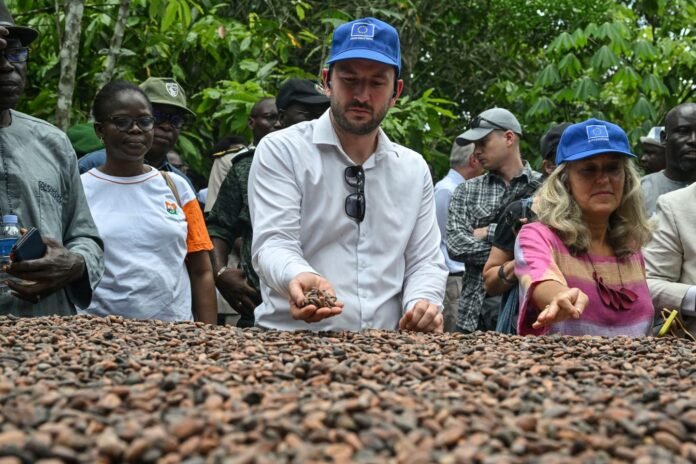About fifty industry actors and representatives of importing and exporting countries met on Thursday 26 September in Abidjan at the headquarters of the International Cocoa Organization (ICCO). On this occasion, exporters presented a common goal: to postpone the entry into force of the European rules on products derived from deforestation (RDUE) by two years, scheduled for the end of January 2025.
In a statement read by their spokesman, Ivorian Aly Touré, the exporting countries condemn delays ” unrealistic in terms of the requirements of the Regulation, from geolocation of all grounds to the establishment of an exhaustive traceability system, a system which is still not operational less than one hundred days from the implementation date “.
In addition to the host country, the world’s leading producer and exporter, Brazil, Indonesia and Cameroon are among the group of twenty-three bean-producing states that support this demand. A complaint filed by the association of European chocolate producers and hammered out in New York, where many leaders gathered from September 22 to 27 during the United Nations General Assembly.
With results: On 2 October, the European Commission decided on a 12-month postponement. ” Taking into account the feedback received from international partners on their state of preparedness, the Commission also proposes to give the parties concerned additional time to prepare. Brussels explains in a press release.
Guarantee the legality of the origin of the products
The RDUE, voted in the spring of 2023, aims to ban the import of any product that comes from plantations created in a forest area after 2020. Timber, cocoa, rubber, soy and other resources from areas cleared there are less than five years old. A seniority bonus, combined with a national traceability system (SNT), established in each producer country, must guarantee the legality of the origin of the products.
Three months before the original deadline, just under 800 cocoa cooperatives, out of a target of 2,000, have been approved by the SNT in Côte d’Ivoire. The world’s leading producer of beans says it is confident of its ability to implement it by the end of the year. However, the Ivorian Coffee-Cocoa Council, which manages the sector, is also calling for a delay that would allow ” to initiate consultations with all stakeholders and in particular with the EU to define the terms of use of the SNT to carry out due diligence because we do not have clarity on this aspect “.
It is clear that Abidjan wants to know its exact contribution to the verification processes planned to check the origin of food products that are candidates for export. An uncertainty that the Commission is trying to respond to through the recent publication of “additional guidance documents”.
Preserve forests
In their statement, cocoa exporters also point out the complexity represented, for ” the small players of [leurs] pays”, the obligation to provide identification and geolocation data for reasons compatible with the European General Data Protection Regulation (GDPR). An example, according to them, of ” potentially harmful effects that a hasty implementation of the EUDR could have on the producer countries, especially for small producers, in terms of deterioration of their living conditions, worsening of poverty and obstacles to access to the European market “.
For his part, the director of the International Cocoa Organization, Michel Arrion, believes that by setting 2020 as the production limit year in deforested areas, “The EU has been quite generous because it provides amnesty for the potential illegal past of many goods”. According to him, beyond the issue of postponement, the debate should focus more on the cost of compliance for planters.
” Will these investments be one-time or annual? Will they be written off quickly? Should they be covered by other costs? Integrate them in the calculation of sales prices with an accentuated differentiation between the farm gate price and the price for export? », asks the head of ICCO.
Follow us on WhatsApp
Stay informed
Receive the essential African news on WhatsApp with the channel “Monde Afrique”.
Participate
According to the latter, bean-exporting countries should not declare victory too soon after receiving the green light from the European Commission, while two European legislative bodies need to be convinced: the Council and the Parliament, which plan to examine this postponement project in the coming weeks. Environmental organizations should then advocate for strong and immediate action to preserve the forests.
